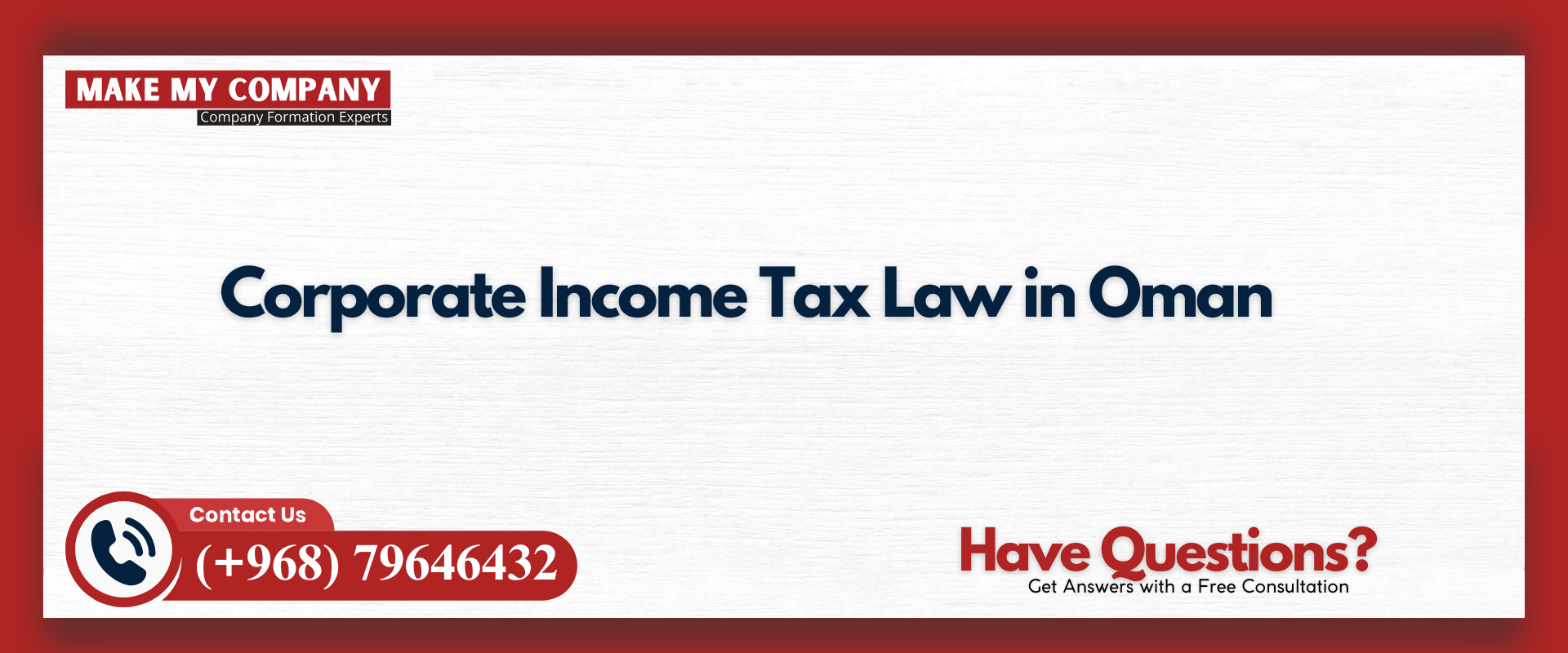Corporate taxation is a critical aspect of the business environment in any country, and Oman is no exception. Understanding the corporate tax in Oman is essential for businesses operating or planning to establish themselves in this thriving economy. This comprehensive article explores the legal framework, tax rates, compliance requirements, and exemptions under Oman’s corporate tax system, offering businesses the insights they need to navigate this landscape effectively.
What is Corporate Tax in Oman?
Corporate tax in Oman refers to the tax levied on the profits of companies operating within the Sultanate. It is a fundamental part of the Omani tax system, regulated by the Omani Income Tax Law. This tax applies to both local businesses and foreign companies conducting business activities in Oman. The Oman Tax Authority (OTA) oversees the administration of corporate tax, ensuring compliance and fairness in the process.
Corporate tax encompasses various income sources, including revenue from business operations, investment income, and capital gains. By taxing these sources, the government supports public services and infrastructure development while maintaining a competitive business environment.
Key Features of Corporate Tax Law in Oman
The corporate tax law in Oman is designed to provide clarity, structure, and fairness to businesses operating within its borders. Understanding the key features of this law is vital for compliance and effective financial planning. Here are some of the major components:
Applicability of Corporate Tax
Corporate tax in Oman applies to a range of entities, ensuring inclusivity in the taxation system. Businesses subject to corporate tax include:
- Omani companies registered under the Commercial Companies Law.
- Permanent establishments of foreign companies operating within Oman.
- Partnerships and joint ventures conducting taxable activities in Oman.
Taxable income includes profits from trading, services, and other business operations, as well as capital gains and dividends. The comprehensive scope ensures that all income generated within Oman’s jurisdiction is taxed equitably.
Tax Rates in Oman
The corporate tax structure in Oman is designed to accommodate businesses of all sizes and industries. The rates are as follows:
- 15% Standard Corporate Tax Rate: This rate is applicable to most companies operating in Oman and forms the backbone of the corporate tax system.
- 0% Tax for Small and Medium Enterprises (SMEs): To encourage entrepreneurship and support economic growth, SMEs meeting specific criteria enjoy a tax-free status.
- 55% Tax on Petroleum Companies: Companies engaged in oil and gas exploration and production are subject to this higher rate, reflecting the sector’s significant contribution to the economy.
These rates provide clarity and predictability, enabling businesses to plan their financial strategies effectively.
Tax Exemptions
Oman’s tax system incorporates exemptions to promote economic diversification and development. Sectors benefiting from exemptions include:
- Agricultural and fishing activities.
- Education and healthcare services.
- Tourism-related projects.
- Renewable energy initiatives.
These exemptions reflect the government’s commitment to fostering sustainable growth and supporting industries that contribute to societal well-being.
Filing and Compliance Requirements
Ensuring compliance with the corporate tax system in Oman involves understanding the mandatory procedures and meeting all deadlines. Below is an in-depth look at the essential steps for filing and adhering to tax regulations:
Tax Registration
All entities subject to corporate tax in Oman must register with the Oman Tax Authority. This process is a mandatory first step in ensuring compliance. Companies are required to:
- Complete and submit a tax registration form.
- Provide supporting documents, including their commercial registration certificate and other relevant records.
Timely registration is essential to avoid penalties and ensure smooth tax operations.
Filing Tax Returns
Taxpayers in Oman must file annual tax returns that provide a detailed overview of their financial activities. The filing process includes:
- Submitting audited financial statements prepared by a certified accountant.
- Declaring taxable income and calculating the tax payable.
The deadline for filing tax returns is within six months of the end of the fiscal year. Businesses should prioritize accuracy and completeness to avoid delays and penalties.
Payment of Taxes
Taxes can be paid as a lump sum or in installments, offering flexibility to businesses. However, late payments attract penalties, emphasizing the importance of timely settlements. Efficient financial planning can help companies meet their tax obligations without disrupting cash flow.
Withholding Tax
Withholding tax applies to payments made to non-resident entities for specific services. The rates include:
- 10% on royalties and technical services.
- 10% on dividends and interest payments.
This mechanism ensures that foreign entities contribute fairly to the tax system while operating in Oman.
Double Taxation Avoidance Agreements (DTAAs)
Oman has established Double Taxation Avoidance Agreements (DTAAs) with several countries to prevent businesses from being taxed twice on the same income. These agreements offer relief through:
- Tax credits.
- Exemptions for specific income categories.
DTAAs foster a favorable environment for foreign investment by reducing the tax burden and promoting international business relations.
Importance of Corporate Tax Compliance
Compliance with the corporate tax in Oman is crucial for maintaining business integrity and avoiding legal issues. Key benefits of compliance include:
- Avoidance of Penalties: Adhering to tax regulations prevents financial penalties and potential legal disputes.
- Positive Reputation: Demonstrating compliance enhances a company’s reputation among stakeholders.
- Economic Contribution: By paying taxes, businesses contribute to Oman’s economic development and public services.
Challenges in Corporate Tax Compliance
While compliance is essential, businesses often encounter challenges such as:
- Complex Regulations: Understanding and interpreting tax laws can be challenging, especially for foreign entities.
- Cross-Border Tax Obligations: Managing international tax requirements adds complexity.
- Frequent Legal Amendments: Keeping up with changes in tax laws requires constant attention.
Engaging professional tax consultants can alleviate these challenges and ensure accurate compliance.
Recent Amendments in Corporate Tax Laws
The Omani government continuously updates its tax regulations to align with global standards and economic objectives. Recent changes include:
- Introduction of VAT: A 5% Value Added Tax was introduced to diversify revenue sources.
- Digital Tax Filing: Enhancements in the digital tax filing system simplify compliance for businesses.
- Anti-Tax Evasion Measures: Stricter regulations combat tax evasion and promote transparency.
Staying informed about these changes is essential for businesses to adapt and remain compliant.
Benefits of Corporate Tax in Oman for Businesses
Corporate tax in Oman offers several advantages that directly benefit businesses and foster economic growth. By understanding these benefits, companies can effectively utilize the tax system to their advantage while contributing to the nation’s development.
Support for SMEs
The zero-tax rate for eligible SMEs encourages entrepreneurship, fostering innovation and job creation. This incentive supports Oman’s vision of a diversified economy.
Sector-Specific Incentives
Tax exemptions for priority sectors attract domestic and foreign investments, promoting growth in industries such as education, healthcare, and renewable energy.
Predictable Tax Environment
Oman’s stable and transparent tax system enables businesses to make long-term plans with confidence. This predictability enhances the overall investment climate.
How to Ensure Corporate Tax Compliance in Oman?
Businesses can ensure compliance with the corporate tax in Oman through the following measures:
- Hire Qualified Accountants: Experienced accountants can maintain accurate financial records and manage tax filings efficiently.
- Stay Updated: Regularly monitor updates and announcements from the Oman Tax Authority.
- Leverage Digital Tools: Utilize accounting software to streamline tax processes and maintain accurate records.
- Seek Expert Advice: Consulting tax professionals familiar with Oman’s tax laws ensures compliance and minimizes risks.
Conclusion
Understanding the corporate tax in Oman is essential for businesses seeking success in this dynamic market. Oman’s tax laws offer clarity, incentives, and a fair framework to support businesses while contributing to the nation’s economic growth. By staying informed and compliant, companies can thrive and build a strong foundation in Oman’s business ecosystem. For expert guidance and tailored solutions in corporate tax compliance, contact Make My Company, your reliable partner in achieving business excellence.









